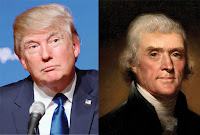As someone who once taught courses at Williams College on the presidency, I suppose I should
The Presidential Character: Predicting Performance in the White House.
chime in. One of the simplest models on predicting presidential performance comes from James David Barber's book,
He evaluates presidents along two variables: Are they active or passive, and are they - for lack of better words - happy or sad. In this model, Trump falls into what Barber sees as the most useful quadrant, active-positive. This places Trump among previous active-positive presidents like Thomas Jefferson and F. D. Roosevelt. In many ways, it might be useful to explore the parallels between Trump and Jefferson to see what might happen - good or bad - under an "America First" president.
Here's a useful link regarding Barber's model,
http://academic.regis.edu/jriley/414%20presidential_character.htm
As I initially explored the idea of a Jefferson and Trump comparison, I was intrigued to see that I was not among the first to take this connection seriously. For example,
Rhys Jones wrote an interesting article on this topic in History Today, just prior to the election, called "Donald Trump and the Election of 1800." He makes is clear that Trump has tapped into a theme of anti-globalization that would have been attractive to many of our Founding Fathers, including Jefferson. Comparing the two, he writes:
Both consider the US to be a world unto itself. In 1803, Jefferson purchased the vast Louisiana territories from Napoleon at the fire sale price of two cents per acre. The resulting westward expansion enabled him to re-orientate America away from its eastern seaboard, away from Atlantic trade, and towards the promise of a simpler future, in which traditionalism and localism would take precedent over global commerce. Jefferson often referred to America as an ‘Empire of Liberty’, a continent that would mind its own business, safely cocooned from the complicated politics and warfare of Napoleonic Europe. These same instincts for isolationism fixate Trump and his base. In his disregard for NATO and adherence to economic protectionism, Trump imagines that America can – literally – wall itself off from the outside world.
Likewise, Jones sees Jefferson's powerful anti-elitism as another key similarity with the out-spoken and often outrageous Trump:
And while Jefferson was not a rabble-rouser like Trump, he certainly indulged the politics of populism. During a series of agrarian revolts in Massachusetts in 1787, which threatened to violently overturn local government, Jefferson applauded the rioters. ‘A little rebellion now and then is a good thing’, he wrote. The revolt was stimulated by economic hardship among the rural population who demanded financial relief and the printing of paper money – sentiments that earned Jefferson’s sympathy.
All in all, Jefferson advocated states' rights over the federal government. Like Trump, he focused on cutting the size of the federal government and reduced its spending (even on the military). He paid $15 million for the Louisiana Purchase, and neatly doubling the nation's size while he was in office. Like Jefferson, Trump as the opportunity to grow our nation's wealth and status: "Big League." Thanks to Barber's insight, there is a good chance that Trump has what it takes to win this fight too.
John C. Drew, Ph.D. is an award-winning political scientist.







